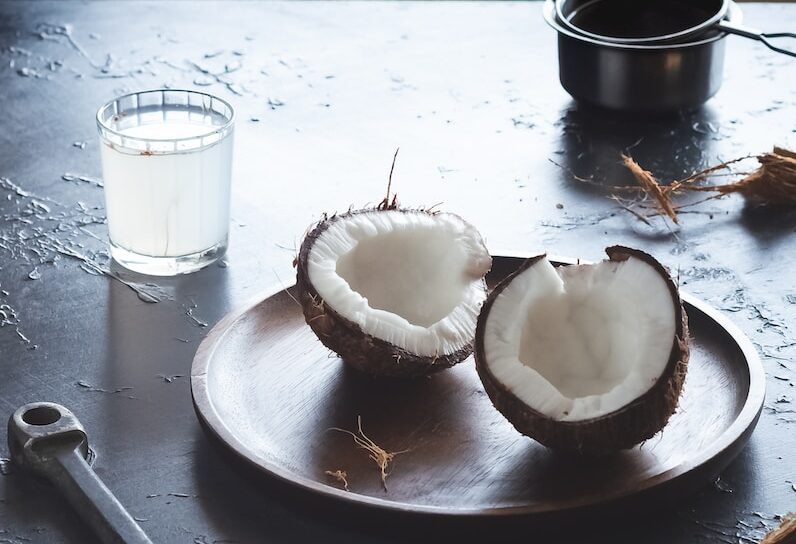Coconut water and coconut milk both have a unique and refreshing taste that is commonly associated with tropical locations. While the two are often used interchangeably in recipes, they are quite different in terms of composition and nutritional benefits. In this article, we’ll delve into the key differences between coconut water and coconut milk, as well as their respective benefits.
Key Takeaways:
- Coconut water and coconut milk are two different liquids extracted from the coconut fruit.
- Coconut water is the clear liquid found in young green coconuts, while coconut milk is made by blending coconut meat with water.
- Coconut water is low in calories, rich in electrolytes and hydrating properties, making it a great post-workout drink.
- Coconut milk is high in calories, fat, and nutrients, making it a great dairy-free alternative in recipes.
- Both coconut water and coconut milk have unique nutritional benefits that can contribute to overall health and wellness.
What is Coconut Water?
Coconut water is the clear liquid inside a young, green coconut. It is a refreshing and nutritious beverage that has gained popularity in recent years. Coconut water is naturally low in calories, fat, and sugar, making it a great option for those seeking a healthy alternative to sugary drinks.
But is coconut water good for you? Absolutely! Coconut water is a rich source of vitamins, minerals, and electrolytes. It is also a great source of hydration, providing a refreshing beverage that is perfect for staying hydrated in hot weather.
The health benefits of coconut water are numerous. It is packed with potassium, which helps to regulate blood pressure and prevent heart disease. Additionally, coconut water contains antioxidants that help to fight free radicals and reduce the risk of chronic diseases such as cancer and Alzheimer’s disease.
Overall, coconut water is a delicious and healthy beverage that is perfect for staying hydrated and promoting overall health and well-being. Incorporating coconut water into your diet can be a simple and effective way to improve your health and support your body’s natural functions.
What is Coconut Milk?
Coconut milk is a creamy liquid that is made by blending coconut meat with water and then straining it through a cheesecloth. It has a rich, luxurious texture and sweet flavor that make it a popular ingredient in many cuisines around the world.
Coconut milk is known for its nutritional value as it is packed with vitamins and minerals. It is a good source of potassium, magnesium, and iron, which help to maintain heart, muscle, and nerve function. It is also rich in medium-chain fatty acids (MCFAs) that provide a quick source of energy and boost overall metabolic function.
Many studies suggest that coconut milk is good for you, as it may offer a range of health benefits. Its high lauric acid content can help to boost your immune system and improve your cholesterol profile. Coconut milk is also rich in antioxidants that can protect your body against cellular damage and reduce the risk of chronic diseases like cancer and heart disease.
Differences Between Coconut Water and Coconut Milk
While both coconut water and coconut milk come from the coconut fruit, they have distinct differences in appearance, taste, consistency, and culinary applications.
Appearance
Coconut water is a clear, slightly sweet liquid found inside a young, green coconut. On the other hand, coconut milk is a thick, creamy liquid with a white color extracted from the meat of a mature coconut.
Taste
Coconut water has a refreshing, nutty flavor with a slightly sweet taste. Coconut milk, on the other hand, has a richer, creamier taste due to its higher fat content.
Consistency
Coconut water has a thin, watery consistency while coconut milk is thicker, almost resembling heavy cream or whole milk.
Culinary Applications
Coconut water is often consumed as a hydrating beverage, sports drink, or natural remedy for dehydration due to its electrolyte content. Coconut milk is a versatile ingredient used in savory and sweet dishes such as curries, smoothies, and desserts.
So, while both coconut water and coconut milk have their unique traits, they are not interchangeable in recipes and serve different purposes and culinary applications.
Benefits of Coconut Water and Coconut Milk
Both coconut water and coconut milk offer a plethora of health benefits. Let’s take a closer look at each.
Benefits of Coconut Water
Coconut water is low in calories and a natural source of electrolytes, making it an excellent choice for hydration.
- Replenishes lost fluids
- Restores electrolytes lost during exercise
- May help to lower blood pressure
- Contains antioxidants and anti-inflammatory properties
Whether you’re looking to rehydrate after an intense workout, or simply seeking a refreshing drink on a hot day, coconut water is an excellent choice.
Benefits of Coconut Milk
Coconut milk is rich and creamy and can add depth and flavor to various dishes. Here are some of its potential health benefits:
- Contains medium-chain triglycerides (MCTs), which can aid in weight loss and improve brain function
- May help to boost immunity
- Contains potassium and other essential minerals
- May help to reduce inflammation
Coconut milk can be used as a base for smoothies, soups, curries, and more, making it a versatile and nutritious addition to any diet.
Conclusion
In conclusion, coconut water and coconut milk are two distinct beverages with unique nutritional profiles and uses. While coconut water is rich in electrolytes and can be used to hydrate and replenish the body, coconut milk offers a creamy texture and is a versatile ingredient in culinary applications.
Despite their differences, both coconut water and coconut milk offer a range of health benefits. Coconut water can assist with rehydration and has been linked to improved digestion, while coconut milk is rich in medium-chain triglycerides (MCTs) that may aid in weight loss and support heart health.
Whether you prefer the taste of coconut water or coconut milk, adding these beverages to your diet can provide a range of health benefits. Consider incorporating coconut water into your post-workout routine or using coconut milk as a dairy-free alternative in your favorite recipes.
FAQ
Q: What is the difference between coconut water and coconut milk?
A: Coconut water is the clear liquid found inside young, green coconuts. It is naturally sweet and refreshing, often consumed as a beverage. On the other hand, coconut milk is made by blending the white flesh of mature coconuts with water. It has a creamy texture and is commonly used in cooking and baking.
Q: What are the benefits of coconut water?
A: Coconut water is a natural source of hydration and is packed with electrolytes such as potassium, magnesium, and calcium. It is low in calories and fat, making it a healthy choice for replenishing fluids and nutrients after physical activity.
Q: What are the benefits of coconut milk?
A: Coconut milk is a rich source of healthy fats, vitamins, and minerals. It can support digestion, promote weight management, and provide nourishment for the hair, skin, and nails. The fats in coconut milk are also known to have anti-inflammatory properties.
Q: How do coconut water and coconut milk differ in appearance and taste?
A: Coconut water is clear and has a slightly sweet, nutty flavor. It is often described as refreshing and thirst-quenching. Coconut milk, on the other hand, has a creamy white color and a rich, tropical flavor. It adds a distinct taste to dishes and desserts.
Q: What can coconut water and coconut milk be used for in culinary applications?
A: Coconut water can be enjoyed on its own or used as a base for smoothies, cocktails, and mocktails. Coconut milk is commonly used in curries, soups, sauces, desserts, and vegan dishes as a creamy and flavorful alternative to dairy.
Q: How can incorporating coconut water and coconut milk benefit overall health?
A: Drinking coconut water can help maintain proper hydration, support heart health, and improve digestion. Coconut milk can provide a source of healthy fats and nutrients, promote satiety, and contribute to healthy hair, skin, and nails.
 Skip to main content
Skip to main content


